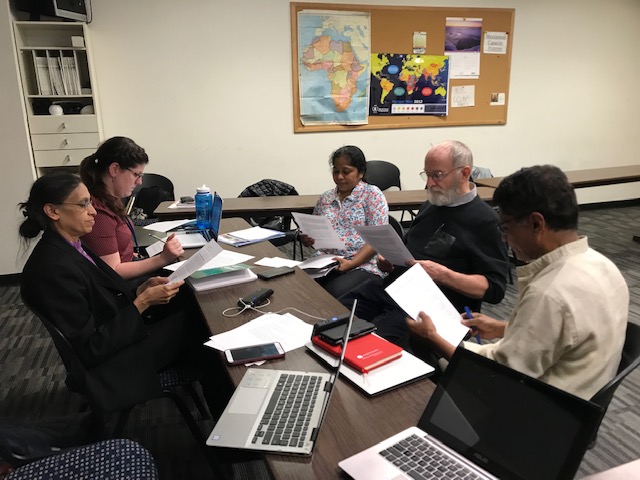In 2017, the Committee decided to shift to thematic working groups from its functional working group structure in the previous years. As the NGO Committee’s strength lies in its membership’s link to the grassroots level and recognizing that, In the global discussions that take place at the UN and elsewhere, the severity of the impact of policy decision made at the global level on the poor and marginalized tend to receive little attention, the priority areas are intended to keep the focus on the larger goal of eradicating poverty. In this regard, the Committee conducts an annual membership survey following its annual meeting in June to decide on topics to consider in the upcoming year.
For the 2019-2021 cycle, the Committee is focusing on three priority areas – Social Protection, Financial Inclusion and Climate Finance. The first two priority areas have been chosen as strengthening advocacy on those two topics are crucial to protecting and building the capacity of grassroots communities to lead productive lives. The third priority has been chosen as global and national resources allocated to climate action must be aligned to the Paris Agreement. The Committee brings focus to these priority areas though written responses/statements to UN processes (e.g., during the preparatory process for the Financing for Sustainable Report), through organizing side events and parallel events on the priority areas well through its advocacy initiatives.
Financial & Digital Inclusion

The Addis Ababa Action Agenda contains 14 distinct policy commitments on achieving financial inclusion. Financial inclusion is featured as a target in 8 of the 17 UN Sustainable Development Goals (SDG). These include SDG 1, 2, 3, 5, 8, 9, 10 and 17. Recognizing that the purpose of Financial inclusion is alone to open a bank, but also to provide people of low-income and disadvantaged sections of the society have access to necessary resources to escape poverty, recover from setbacks and ensure their long term well-being, the working group advocates for inclusive finance that provides access for marginalized communities, women, micro small and medium enterprises to receipt and payment processes, savings, loans and credit at affordable costs, while ensuring that they have the necessary skills and tools at their disposal to manage their finances effectively and efficiently in a secure manner.
Co-Leads: Anita Thomas, Linda M. Sama
Social Protection
Leaving No One Behind (LNOB) is one of the transformational shifts that were envisaged when the global community arrived at a consensus to move forward from the Millennium Development Goals framework to Sustainable development goals. In our view, LNOB should be the overarching goal of the SDGs -Agenda 2030. The groundbreaking agreement, the Addis Ababa Action Agenda (AAAA), built on the outcomes of two previous Financing for Development conferences, in Monterrey, Mexico, and in Doha, Qatar along with the Paris Climate Agreement now provide the foundational policies for implementing the Agenda 2030. In AAAA, countries adopted a new social compact in favor of the poor and vulnerable groups, including through the provision of social protection systems and measures for all, including social protection floors, along with coherent modalities for mobilizing additional domestic and international support for their provision. The Social Protection Working Group commits itself to understanding the import of social protection commitments made in the AAAA and develops advocacy strategies that will help meet the larger goal of Leaving No One Behind.
Co-Leads: Jimmy Walters, Anne Deepak
Climate Finance

The Climate Finance Working Group (CFWG) works to monitor global and national financial flows and mechanisms that both alleviate and exacerbate the climate emergency, with particular focus on ensuring that the actions outlined in the Paris Agreement are being implemented. The CFWG seeks to use our collective knowledge to 1) inform the larger NGO Committee on FfD, 2) advocate for green pathways to implement and attain Sustainable Development Goals’ targets and 3) advocate for immediate, aggressive multilateral climate action – foremost, a moratorium on the subsidization of fossil fuels and cross-sector divestment from all non-renewable carbon-emitting energy sources..
Co-Leads: Chrisina Hu, Vernonica Brand
